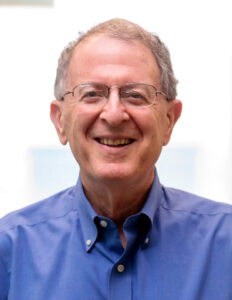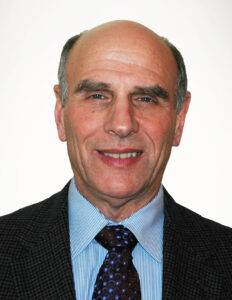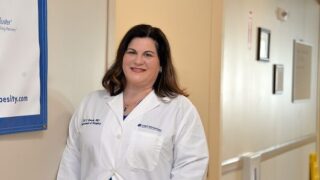2023 Winners
The three esteemed recipients of the 2023 Albany Medical Center Prize in Medicine and Biomedical Research are scientists whose research has advanced the study and understanding of microbiomes and bacteria and how they communicate in the body and cause or prevent disease.
The Albany Prize is made possible by the Marty and Dorothy Silverman Foundation

Bonnie L. Bassler, PhD
Bonnie L. Bassler, PhD
The Squibb Professor & Chair, Department of Molecular Biology
Princeton University
Investigator, Howard Hughes Medical Institute
Bonnie L. Bassler, PhD, is a member of the National Academy of Sciences and the American Academy of Arts and Sciences. Dr. Bassler received a BS in biochemistry from the University of California at Davis, and a PhD in biochemistry from the Johns Hopkins University. She performed postdoctoral work in genetics at the Agouron Institute, and she joined the Princeton faculty in 1994. The research in her laboratory focuses on the molecular mechanisms that bacteria use for intercellular communication. This process is called quorum sensing. Dr. Bassler’s research is paving the way to the development of novel therapies for combating bacteria by disrupting quorum-sensing-mediated communication.
At Princeton, Dr. Bassler teaches both undergraduate and graduate courses. Dr. Bassler directed the Molecular Biology Graduate Program from 2002-2008 and she currently chairs Princeton University’s Council on Science and Technology which has revamped the science curriculum for humanists. Dr. Bassler is a passionate advocate for diversity in the sciences and she is actively involved in and committed to educating lay people in science.
Dr. Bassler was awarded a MacArthur Foundation Fellowship in 2002. She was elected to the American Academy of Microbiology in 2002 and made a fellow of the American Association for the Advancement of Science in 2004. She was given the 2003 Theobald Smith Society Waksman Award and she is the 2006 recipient of the American Society for Microbiology’s Eli Lilly Investigator Award for fundamental contributions to microbiological research. In 2008, Dr. Bassler was given Princeton University’s President’s Award for Distinguished Teaching. She is the 2009 recipient of the Wiley Prize in Biomedical Science for her paradigm-changing scientific research.
She is the 2011 recipient of the National Academies’ Richard Lounsbery Award. She is the 2012 UNESCO-L’Oreal Woman in Science for North America. In 2012, Dr. Bassler was also elected to the Royal Society and to the American Philosophical Society. Dr. Bassler was the President of the American Society for Microbiology in 2010-2011. She is currently the chair of the American Academy of Microbiology Board of Governors. She is a member of the National Science Board and was nominated to that position by President Barack Obama. The Board oversees the NSF and prioritizes the nation’s research and educational priorities in science, math, and engineering.
She was an editor for a decade for Molecular Microbiology, and is currently an editor of mBio, and chief editor of Annual Reviews of Genetics. She is an associate editor for Cell, Proceedings of the National Academy of Sciences, Journal of Bacteriology, and other journals. Among other duties, she serves on the National Academies Board on Life Sciences, the Howard Hughes Medical Institute Science Education Committee, and Discovery Communications’ Science Channel Scientific Advisory Board.
She serves on oversight, grant, fellowship, and award panels for the National Academies of Sciences, National Institutes of Health, National Science Foundation, American Society for Microbiology, American Academy of Microbiology, Keck Foundation, Burroughs Wellcome Trust, Jane Coffin Childs Fund, PEW Charitable Trust, Gordon and Betty Moore Foundation, and the MIT Whitehead Institute.

Jeffrey I. Gordon, MD
Jeffrey I. Gordon, MD
The Dr. Robert J. Glaser Distinguished University Professor
Director, The Edison Family Center for Genome Sciences and Systems Biology
Washington University School of Medicine in St. Louis
Jeffrey I. Gordon, MD, received his AB from Oberlin College and his MD from the University of Chicago. He completed his clinical training in internal medicine and gastroenterology at Washington University in St. Louis and was a post-doctoral fellow in the Laboratory of Biochemistry at NIH’s National Cancer Institute. He subsequently joined the faculty at Washington University, where he has spent his entire career, first as a member of the Departments of Medicine and Biological Chemistry, then as head of the Department of Molecular Biology and Pharmacology, and now as founding director of the University’s interdepartmental Center for Genome Sciences and Systems Biology.
Dr. Gordon was elected to the National Academy of Sciences in 2001 (where he served as chair of its ‘Medical Physiology and Metabolism’ Section from 2010-2013), the American Academy of Arts and Sciences in 2004, the National Academy of Medicine in 2008, and the American Philosophical Society in 2014.
His awards include the Selman A. Waksman Award in Microbiology from the National Academy of Sciences (2013), the Robert Koch Award (2013), the Passano Laureate Award (2014), the Dickson Prize in Medicine (2014), the King Faisal International Prize in Medicine (2015), the Keio Medical Science Prize (2015), the Massry Prize (2017), the Sanofi-Institut Pasteur International Award for Biomedical Research (2017), the Louisa Gross Horwitz Prize (2017), the Copley Medal from the Royal Society (2018), the BBVA Foundation Frontiers of Knowledge Award in Biology and Biomedicine (2019), the Balzan Prize (2021), the David and Beatrix Hamburg Award for Advances in Biomedical Research and Clinical Medicine from the National Academy of Medicine (2022), the Dr. Paul Janssen Award for Biomedical Research (2022) and the Princess of Asturias Award for Technical and Scientific Research (2023).
He has published 546 papers, is a Thomson Reuters Citation Laureate (Physiology or Medicine; 2015), holds 25 U.S. patents, and has received honorary degrees from the University of Gothenburg (Doctor of Medical Sciences, 2011) and the University of Chicago (Doctor of Science, 2014).
He has had the privilege and pleasure of serving as the research mentor to 146 PhD students and post-doctoral fellows since his lab was established.

Dennis L. Kasper, MD
Dennis L. Kasper, MD
William Ellery Channing Professor of Medicine and
Professor of Immunology, Harvard Medical School
Senior Physician, Brigham and Women’s Hospital
For more than four decades, Dennis L. Kasper, MD, has conducted research in microbiology, immunology, infectious diseases, and public health while discharging a broad range of administrative and educational responsibilities. His studies innovatively integrate microbiology, immunology, structural carbohydrate and lipid chemistry, biochemistry, and genetics.
Dr. Kasper discovered and developed vaccines against group B Streptococcus (GBS), the foremost cause of serious neonatal bacterial infections. His laboratory elucidated the structure of all nine capsular polysaccharides and important surface proteins of this major neonatal pathogen. His group discovered that antibodies to the bacterial capsule are deficient in babies with GBS disease. Ultimately, Dr. Kasper’s work led to a highly immunogenic glycoconjugate vaccine, which is now in clinical trials; in a novel approach, pregnant women are immunized and then transplacentally transfer antibodies to protect the baby. Dr. Kasper defined much of what is known about the pathogenesis of GBS infection and developed an understanding of the polysaccharide conformational epitopes required for induction of protective antibodies. His group explored the physical/chemical parameters required in a conjugate vaccine for optimal immunogenicity and redefined the immunologic mechanisms by which conjugate vaccines stimulate the immune system.
Dr. Kasper’s work on Bacteroides fragilis, an important intestinal commensal, has served as a paradigm for understanding the interrelationship of the gut microbiota and the immune system. Dr. Kasper discovered capsular polysaccharides on the organism’s surface that are essential for virulence. Remarkably, Dr. Kasper’s laboratory found that single strains of B. fragilis produce multiple phase-varying polysaccharides, at least two of which have a zwitterionic charge motif. Overturning immunologic paradigms, he discovered how one zwitterionic polysaccharide, PSA, is processed via the endosomal MIIC pathway in antigen-presenting cells, depolymerized by NO-dependent deamination, and presented to CD4+ T cells by MHCII. His lab then documented an essential role for PSA in shaping mammalian immune development by stimulating normal splenic CD4+ T cell numbers, establishing TH1/TH2 balance, and thereby directing splenic organogenesis. Kasper showed that PSA has potent immunomodulatory and anti-inflammatory activity, stimulating CD4+ T-cell production of IL-10, which protects against inflammatory bowel disease and experimental autoimmune encephalitis (the animal model for multiple sclerosis).
Dr. Kasper delineated the microbiota’s centrality in immune system development, maturation, and regulation, initiating a new and dynamic research field. He defined the phylogenetic diversity, immune mechanisms, and immunomodulatory therapeutic potential of bacteria and bacterial molecules from the microbiome in autoimmune and infectious diseases. His lab developed a novel methodology for moving beyond correlative microbiome-wide analysis to discover key disease-modulating microbes and molecules: they tailored click chemistry to visualize live gut anaerobic commensals and to track specific microbial immunomodulatory molecules into the immune system. His group defined the microbiota’s role in early-life establishment of iNKT cell numbers in colon and lung, determining underlying mechanisms and discovering B. fragilisglycosphingolipid Bf717, which confers lifelong resistance to experimental ulcerative colitis through iNKT cell immunoregulation. PSA and Bf717 are the only immunomodulatory molecules from the microbiome identified so far.
Dr. Kasper’s investigations have opened new fields of research on the role of microbial molecules in shaping immune system development and have enabled probing of the microbiome for new therapeutics. Dr. Kasper’s studies of bacterial–immune system interactions have extraordinary physiologic and therapeutic implications.
Dr. Kasper has been awarded many honors, including the Squibb Award from the Infectious Diseases Society of America, an NIH Career Development Award, an NIH Merit Award, and the Professor John McArthur Award. He has been elected to membership in the American Society for Clinical Investigation, the American Association of Physicians, and the American Academy of Microbiology. He is also a member of the National Academy of Medicine, and in 2018 was elected to membership in the National Academy of Sciences. Dr. Kasper directed the New England Regional Center of Excellence for Biodefense and Emerging Infectious Diseases and is currently the principal investigator of a Center of Excellence for Translational Research at Harvard Medical School.
Dr. Kasper was the first chair of the National Science Advisory Board on Biosecurity. He served as executive dean for Academic Programs at Harvard Medical School, as a member and chair of the NIAID’s Board of Scientific Counselors, and as president of the International Society for Infectious Diseases. From 1995 to 2012, Dr. Kasper was the director of the Channing Laboratory, a research facility with a high international profile, where he played a powerful role in shaping cutting-edge research programs in microbiology and immunology. He has mentored over 70 graduate students and postdoctoral fellows, many of whom are national and international academic leaders.
Since 1990, Dr. Kasper has served as the infectious disease editor for Harrison’s Principles of Internal Medicine (HPIM). He was editor-in-chief of both the 16th and 19th editions of HPIM. He is the author of more than 450 scientific and medical articles in his field.


